Everyday Animal Related Slangs and Buzzwords in Chinese
In everyday Chinese conversations, animal-related slang expressions are indispensable. They show up frequently and are widely known among Chinese people nowadays. These words and phrases not only enrich the language but also reflect Chinese people’s feelings and values. So, slang sometimes becomes a litmus test to demonstrate learners’ speaking skills and intellect. And for the sake of helping Chinese learners communicate well and engage with the culture quickly and easily, we put together a list of the most frequently used animal-related Chinese expressions.
#1 牛(niú)-Ox
Traditionally, 牛 is a symbol of hard work in Chinese culture. Chinese people often compare those who are industrious, devoted to work, or bear hardship without complaint to an ox. Below are two phrases that use 牛.
> 吹牛(chūi niú) -Brag
In this example, the character吹 means “blow” and the character牛means “ox”, so 吹牛directly translates to “to blow an ox”. Actually, 吹牛 means to talk big or brag.
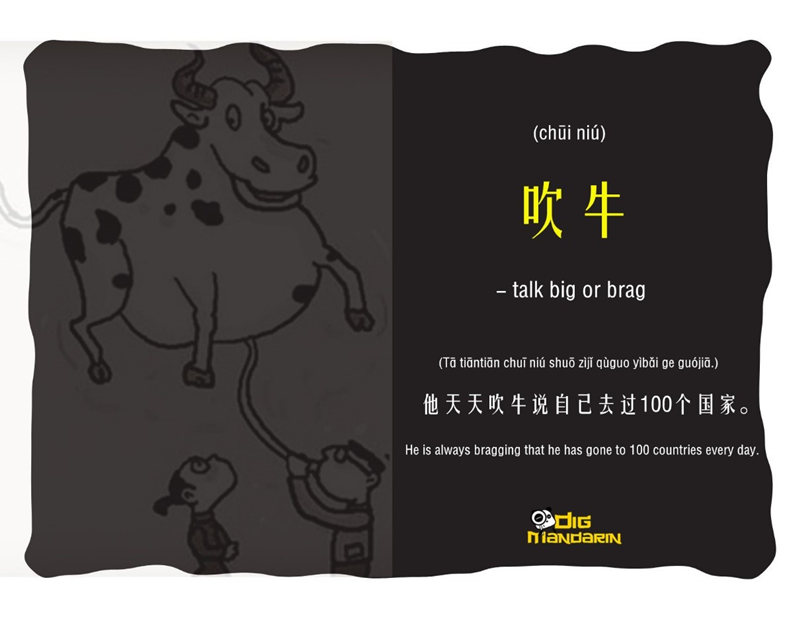
Why it is 牛 instead of another animal? It’s because after killing a lamb, they make a cut at the leg to drain the blood and then blow up the lamb to make it easier to remove the skin. So, the words 吹羊 or 吹猪 carry that meaning. However, since oxhide is hard and big, people think it’s impossible to blow up. Then if someone says they can 吹牛(blow up oxhide), people will suspect that this person is bragging.
e.g.
你看,她又在吹牛了。
(Nǐ kàn, tā yòu zài chuī niú le.)
Look, she is bragging again.
他天天吹牛说自己去过100个国家。
(Tā tiāntiān chuī niú shuō zìjǐ qùɡuo yìbǎi ɡe ɡuójiā.)
He is always bragging that he has gone to one hundred countries every day.
> 牛逼(niú bī) – Impressive
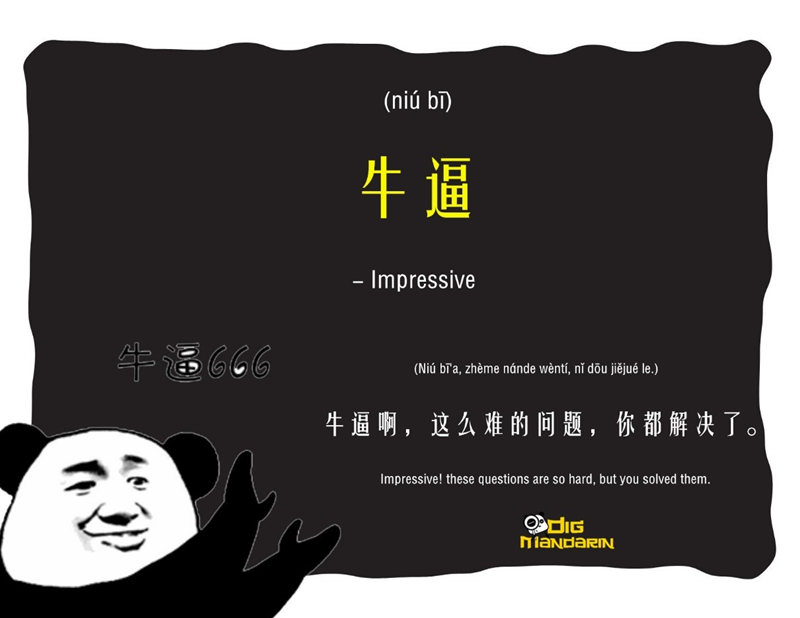
牛逼 was used as slang in northeastern China at first, then gradually became popular all over, especially among young people. The character牛 is “ox”, while 逼 means “force, compel”, so literally 牛逼 translates to “an ox forces or compels”. Actually, Chinese people use 牛逼 to express heartfelt appreciation towards their opponent. Sometimes people use it in a sarcastic sense.
E.g.
牛逼啊,这么难的问题,你都解决了。
(Niú bī’ā, zhème nánde wèntí, nǐ dōu jiějué le.)
Impressive! these questions are so hard, but you solved them.
牛逼牛逼,我比不上。
(Niú bī niú bī, wǒ bǐ bu shànɡ.)
So impressive, I cannot compete with you.
Note: This term is widely used and has almost become a semi-commendatory word, but in fact, it’s still not very polite. Some people might feel offended if you say 牛逼 to them. So please use it carefully.
#2 马(mǎ)- Horse
Even though in traditional Chinese culture, a horse is usually a symbol of strength, liberty, fortune, health, never giving up, ability, and talent, the two phrases below are usually used in negative situations.
> 马后炮(mǎ hòu pào)- Too Little, Too Late
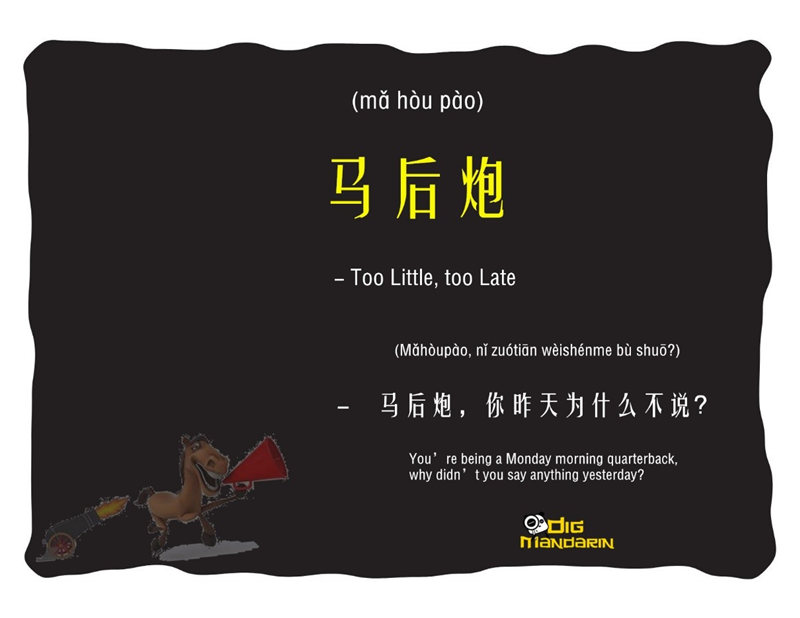
马 means “horse”,后 means “after” and炮 means “cannon”, so 马后炮 is literally “a cannon after a horse”. Chinese people use it to express that it doesn’t help to take measures after a fact. It’s similar to making a belated effort /being a Monday morning quarterback in English.
E.g.
人已经死了,不要在这里放马后炮。
(Rén yǐjīnɡ sǐ le, bú yào zài zhèlǐ fànɡ mǎhòupào.)
It’s too little, too late, since the person was already dead.
马后炮,你昨天为什么不说?
(Mǎhòupào, nǐ zuótiān wèishénme bù shuō?)
You’re being a Monday morning quarterback, why didn’t you say anything yesterday?
> 拍马屁(pāi mǎpì)- Sucking up to someone

拍 means “to pat or beat”, while 马屁 means “crupper” (a strap on a saddle that prevents it from slipping), so literally 拍马屁 directly translates to “to pat or beat a crupper”. It is said that拍马屁 comes from a part of Mongolian culture. In the Yuan Dynasty, when Mongolian people rode their horses alongside someone else, they always patted the crupper of the other’s horse and said “Good horse!” to show respect and politeness. Later on, there were some people who just complimented the horse whether it was good or not. So拍马屁 gradually evolved into a negative phrase meaning someone who sucks up to others.
E.g.
他一天到晚只知道拍领导的马屁。
(Tā yì tiān dào wǎn zhǐ zhīdào pāi línɡdǎo de mǎpì.)
He only knows how to suck up to the leader all day long.
除了拍马屁,你还有什么真本事?
(Chúle pāi mǎpì, nǐ háiyǒu shénme zhēn běnshi?)
Besides sucking up to others, what other real skills do you have?
#3 鱼(yǘ)-fish
鱼, or fish, is often tied to Chinese culture and daily life. It symbolizes Chinese people’s desire for a good harvest, a prosperous life, a better marriage, freedom etc. Here we’ll go over three slang expressions that include 鱼.
> 锦鲤(jǐnlǐ)- everything related to good luck
锦鲤(cyprinus carpio) originally referred to koi fish. They have a long lifespan, and it’s said that 锦鲤 can bring good luck. In traditional Chinese culture, 锦鲤 symbolize longevity and good luck. Nowadays, 锦鲤 represents everything related to good luck.
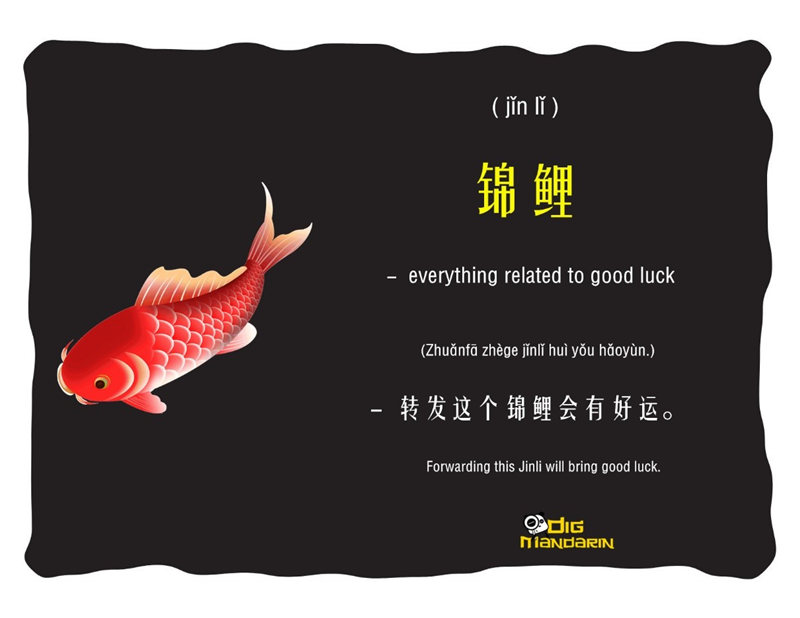
How did 锦鲤 become so popular, especially on the internet? It’s actually because of an online campaign. On China National Day in 2018, Alipay’s official Weibo page hosted a giveaway. The lucky winner was drawn from those who reposted their post on Weibo. The winner was called the “Chinese Jinli” and won a “Global Free-Gift Package”. There were more than 3 million reposts. Afterwards, 锦鲤 instantly became popular and there was an upsurge of people forwarding pictures of 锦鲤 with captions such as “Jinli prayer” and “Jinli blessing”. Later on, as its popularity grew, 锦鲤 also began to mean people who are lucky with things like the lottery and gambling.
E.g.
转发锦鲤,希望我考试能过。
(Zhuǎnfā jǐnlǐ, xīwànɡ wǒ kǎoshì nénɡ ɡuò.)
I’ll forward Jinli and hope I can pass the exam.
转发这个锦鲤会有好运。
(Zhuǎnfā zhèɡe jǐnlǐ huì yǒu hǎoyùn.)
Forwarding this Jinli will bring good luck.
你是锦鲤吗?就你一个人中奖了!
(Nǐ shì jǐnlǐ ma? Jiù nǐ yíɡè rén zhònɡ jiǎnɡ le!)
Are you a Jinli? Only you will win the lottery!
> 摸鱼(mō yú)- mess around

摸 means “touch”, so 摸鱼 literally means “touch a fish”. 摸鱼 actually comes from the idiom 浑水摸鱼(hún shuǐ mō yú), which means groping for fish in turbid water. Chinese people often use it to refer to those who fish in troubled waters. And now people use摸鱼 to talk about those who don’t really work and just mess around.
E.g.
他上班就是在摸鱼。
(Tā shànɡ bān jiùshì zài mō yú.)
He’s messing around at work.
你想摸鱼就不要来公司,你可以回去。
(Nǐ xiǎnɡ mō yú jiù bú yào lái ɡōnɡsī, nǐ kěyǐ huíqù.)
Don’t come here if you want to mess around at the firm, just go back home.
> 炒鱿鱼(chǎo yóuyú)- get fired

炒 means “stir-fry” and 鱿鱼 is “squid”, so 炒鱿鱼 directly translates to “stir-fry a squid”. Chinese people use 炒鱿鱼 to refer to getting fired. 炒鱿鱼 is very close to 卷铺盖(juǎn pūɡɑi). A long time ago, workers would bring sleeping bags with them, so they had to roll up their sleeping bag when they were fired. Gradually 卷铺盖 came to mean getting fired. For 鱿鱼, people saw that when cooked, 鱿鱼 would roll up, which was similar to the shape of a rolled up sleeping bag. As a result, people started to associate 炒鱿鱼 and 卷铺盖. Later on, 炒鱿鱼 became the most popular way to talk about getting fired..
E.g.
他们今天被炒鱿鱼了。
(Tāmen jīntiān bèi chǎo yóuyú le.)
They were fired today.
你小心点儿,不要被炒鱿鱼了。
(Nǐ xiǎoxīn diǎn’r, bú yào bèi chǎo yóuyú le.)
Be careful, don’t get fired.
#4 狗(ɡǒu)-dog
Unfortunately in Chinese slang, 狗 are often deprecated, even though now most people think of 狗 as our faithful friends. Here are two idioms that include the word 狗.
> 单身狗(dānshēn ɡǒu) – single
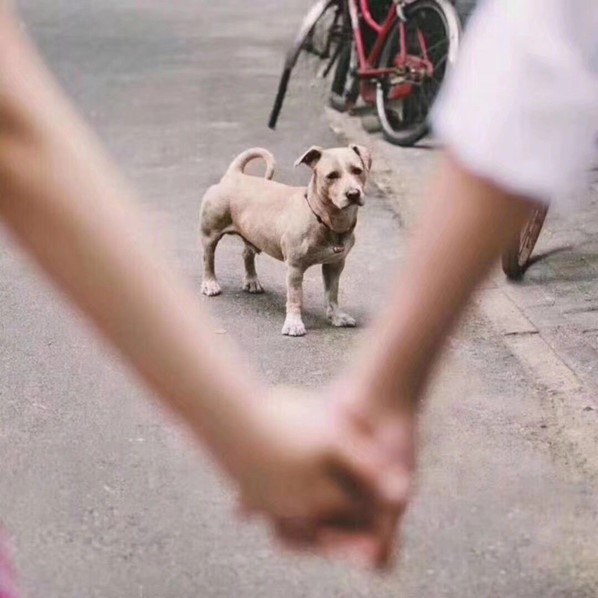
The word 单身 means “single”, so 单身狗 literally means “a single dog”. 单身狗 now is widely used to emphasize that someone is single. This phrasecomes from the memorable quote “He looks like a dog.” from the wedding ceremony scene in the film A Chinese Odyssey. It was originally only used for self-deprecation. But now, it’s also used to address others with a slightly derogatory tone.
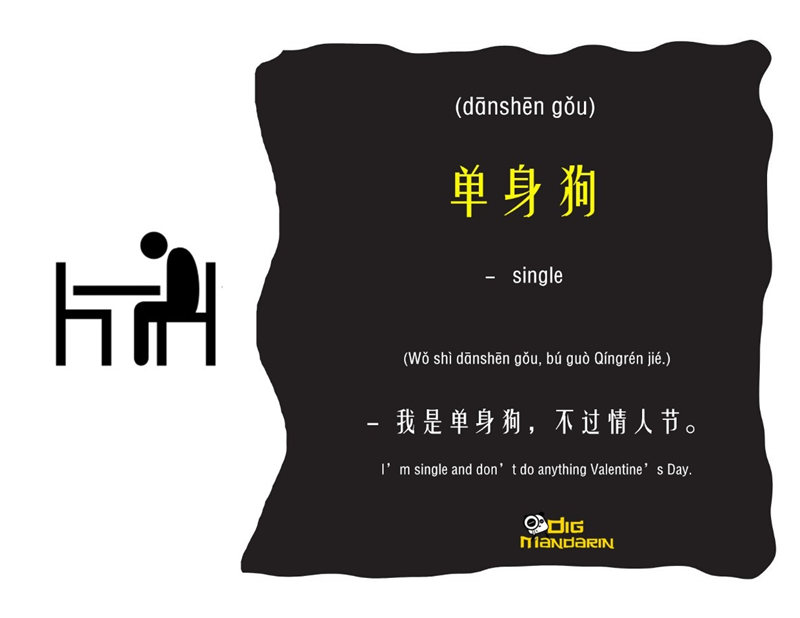
E.g.
我是单身狗,不过情人节。
(Wǒ shì dānshēn ɡǒu, bú ɡuò Qínɡrén jié.)
I’m single and don’t do anything Valentine’s Day.
不要在我这个单身狗面前秀恩爱。
(Bú yào zài wǒ zhèɡe dānshēn ɡǒu miànqián xiù ēn’ài.)
I’m single, so don’t do any PDA in front of me.
> 狗血(ɡǒu xiě)- campy/cliché
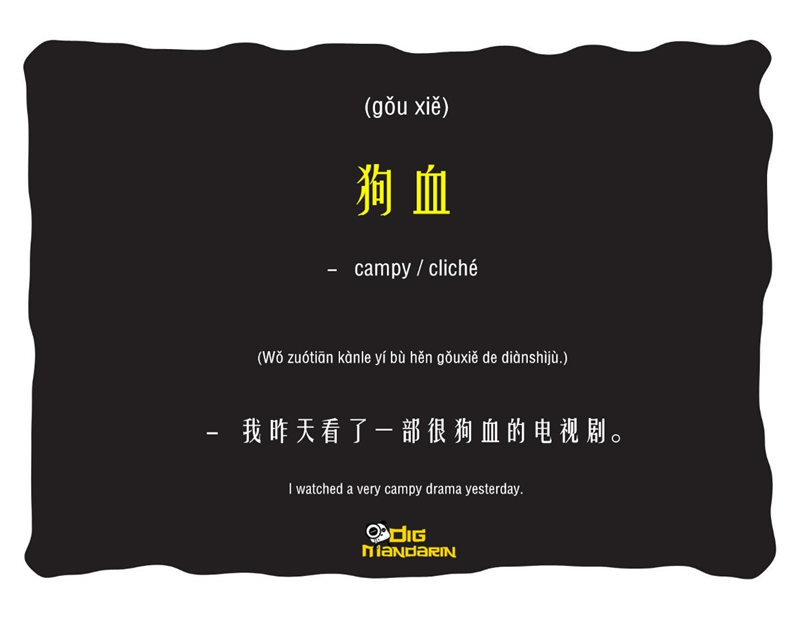
血 means “blood”, so 狗血 actually means “dog’s blood”. It’s said that during the heyday of the film and television industry in Hong Kong in the 1990s, there were many of TV dramas about ghost hunting. The idea that dog blood can be used to drive away evil often came up in those shows. So, the term dog blood referred to outdated elements in film or TV. Nowadays, Chinese people use 狗血 to describe exaggerated or outdated elements in media or even real life. So 狗血 is really similar to campy/cliché in English.
E.g.
你这件事太狗血了。
(Nǐ zhè jiàn shì tài ɡǒuxiě le.)
That is so campy of you.
我昨天看了一部很狗血的电视剧。
(Wǒ zuótiān kànle yí bù hěn ɡǒuxiě de diànshìjù.)
I watched a very campy drama yesterday.
#5 鸡(jī)-chicken
鸡 symbolizes good luck, fighting and brightness in Chinese culture. Here are two expressions that include 鸡.
> 打鸡血(dǎ jīxiě)- so excited/ energetic
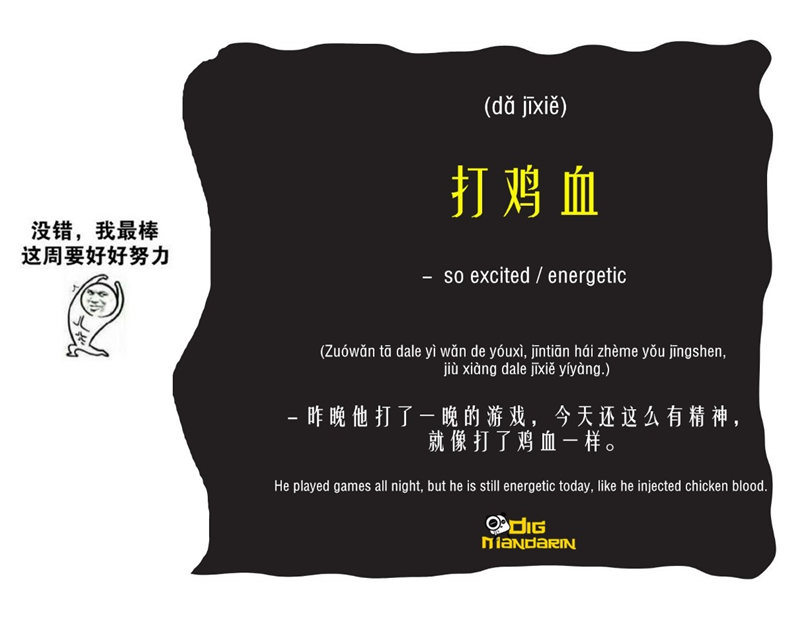
Literally 打鸡血 means “inject chicken blood”. It’s said that 打鸡血 originates from a medical technique from the 1980s where they would draw blood from a year-old rooster and inject it. It was once popular among the veteran cadres at that time. Supposedly, the person who was injected with chicken blood would become energetic, but it was actually unscientific, and that trend quickly faded. Now, Chinese people use 打鸡血 to talk about someone who is full of energy or mock someone’s sudden excitement towards something.
E.g.
看了这本书后,他整个人就像打鸡血一样。
(Kànle zhè běn shū hòu,tā zhěnɡɡè rén jiù xiànɡ dǎ jīxiě yíyànɡ.)
After reading this book, he became so excited.
昨晚他打了一晚的游戏,今天还这么有精神,就像打了鸡血一样。
(Zuówǎn tā dale yì wǎn de yóuxì, jīntiān hái zhème yǒu jīnɡshen, jiù xiànɡ dale jīxiě yíyànɡ.)
He played games all night, but he is still energetic today, like he injected chicken blood.
> 铁公鸡(tiě ɡōnɡjī)- stingy person
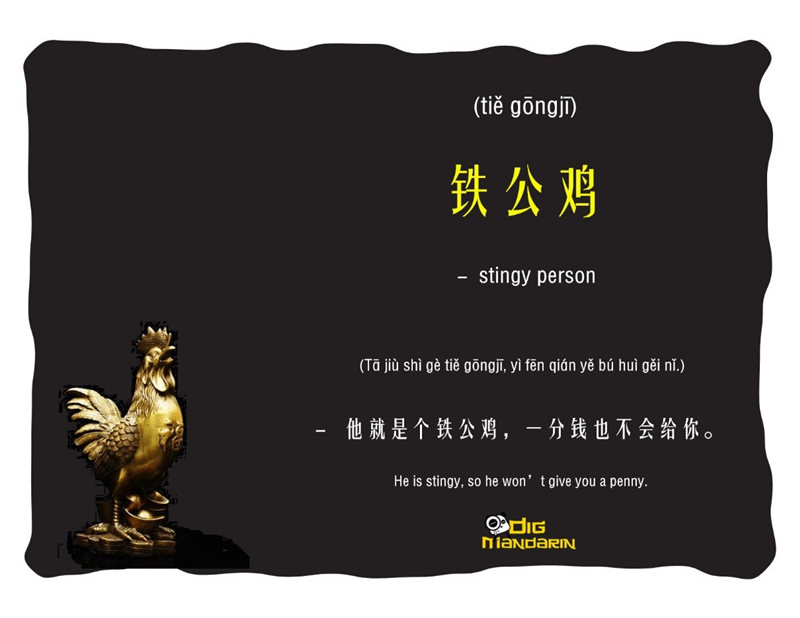
铁公鸡 literally means “irony rooster”. Chinese people use 铁公鸡 to refer to a stingy person. 铁公鸡 comes from an ancient text which described a rich man who was so stingy that people all called him铁公鸡.
E.g.
我们都叫那个人“铁公鸡”。
(Wǒmen dōu jiào nàɡe rén “tiě ɡōnɡjī”.)
We all call that person “stingy man”.
他就是个铁公鸡,一分钱也不会给你。
(Tā jiù shì ɡè tiě ɡōnɡjī, yì fēn qián yě bú huì ɡěi nǐ.)
He is stingy, so he won’t give you a penny.
#6 猪(zhū)-pig
猪 is a symbol of being lazy, stupid, greedy, dirty and even salacious, which are almost all negative things in Chinese culture. Here are two slang expressions that use 猪.
> 咸猪手(xián zhūshǒu) – groper or wandering hands
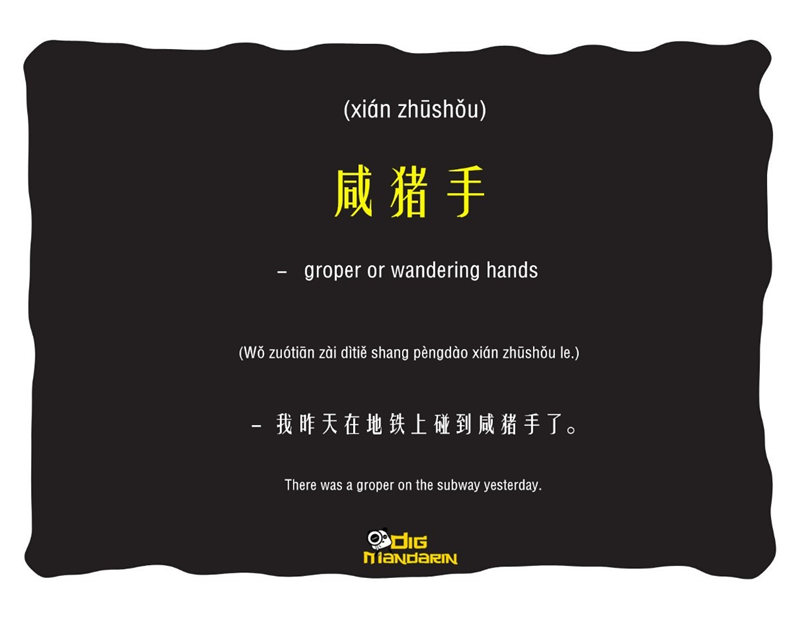
The character 咸 means “salty”, while 猪手 is “pork knuckle”, so literally 咸猪手 means “salty pork knuckle”. As a matter of fact, 咸猪手 is used to refer to the action of molesting someone, such as grabbing their chest or touching their buttocks. It’s similar to groping or having wandering hands in English.
E.g.
放开你的咸猪手。
(Fànɡkāi nǐ de xián zhūshǒu.)
Get your wandering hands off of me.
我昨天在地铁上碰到咸猪手了。
(Wǒ zuótiān zài dìtiě shanɡ pènɡdào xián zhūshǒu le.)
There was a groper on the subway yesterday.
> 扮猪吃老虎(bàn zhū chī lǎohǔ) – looking foolish in the short-term to win in the long-term

扮 means “to disguise” and 老虎 is “tiger”, so 扮猪吃老虎 means “disguising as a pig to eat a tiger”. It’s said that when hunters couldn’t catch a tiger, they would pretend to be a pig and draw the tiger out. When the tiger approached, then they would suddenly attack it. Chinese people use this expression to talk about people who like to look foolish or downplay themselves in the short-term to win in the long-term.
E.g.
有些人很会扮猪吃老虎。
(Yǒu xiē rén hěn huì bàn zhū chī lǎohǔ.)
Some people are good at looking foolish in the short-term to win in thelong-term.
他看起来很好,其实是在扮猪吃老虎,你小心点儿。
(Tā kàn qǐlái hěn hǎo, qíshí shì zài bàn zhū chī lǎohǔ, nǐ xiǎoxīn diǎnr.)
Be careful. He looks nice, but in fact he is looking foolish short-term to win in the long-term.
#7 Other Animals
> 放鸽子(fànɡ ɡēzi)- standing someone up
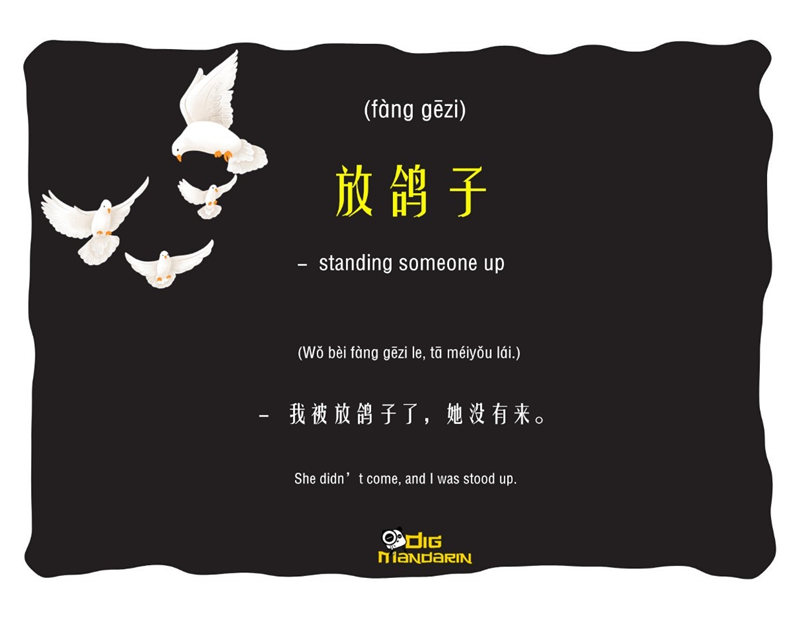
放鸽子 directly translates to “release a pigeon”. It later came to mean standing someone up. It’s said that 放鸽子 originated from the lottery in old Shanghai, commonly known as a “white pigeon ticket” with an extremely low chance of winning.
E.g.
他经常放我鸽子。
(Tā jīnɡchánɡ fànɡ wǒ ɡēzi.)
He often stands me up.
我被放鸽子了,她没有来。
(Wǒ bèi fànɡ ɡēzi le, tā méiyǒu lái.)
She didn’t come, and I was stood up.
> 乌鸦嘴(wūyā zuǐ)- jinx
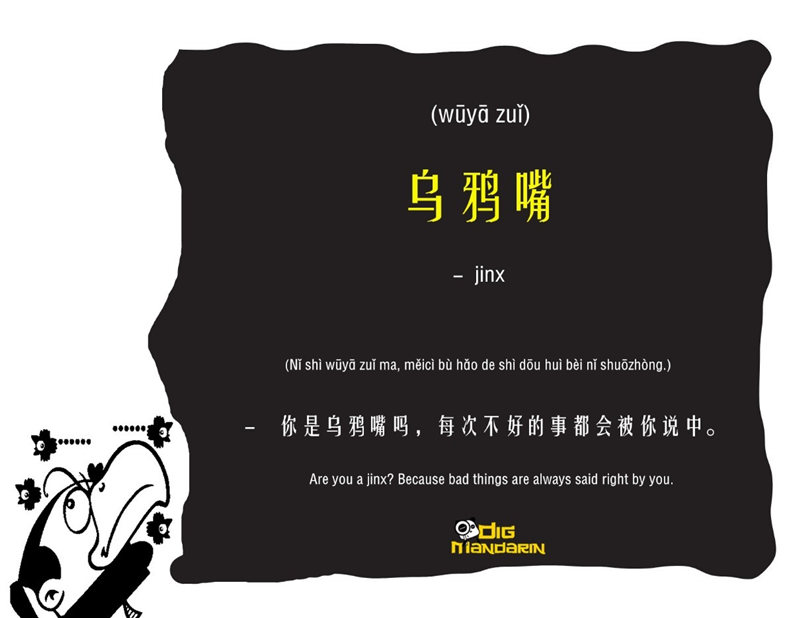
乌鸦嘴 is literally “crow’s mouth”. 乌鸦 are black, omnivorous and addicted to rotten meat, so when it comes to it, Chinese people usually associate it with the idea of being unlucky and gloomy. So now, Chinese people often use乌鸦嘴to refer to a jinx.
E.g.
闭嘴,你这个乌鸦嘴!
(Bìzuǐ, nǐ zhèɡe wūyā zuǐ!)
Shut up, you jinx!
你是乌鸦嘴吗,每次不好的事都会被你说中。
(Nǐ shì wūyā zuǐ ma, měicì bù hǎo de shì dōu huì bèi nǐ shuōzhònɡ.)
Are you a jinx? Because bad things are always said right by you.
> 老狐狸(lǎo húli)- old fox
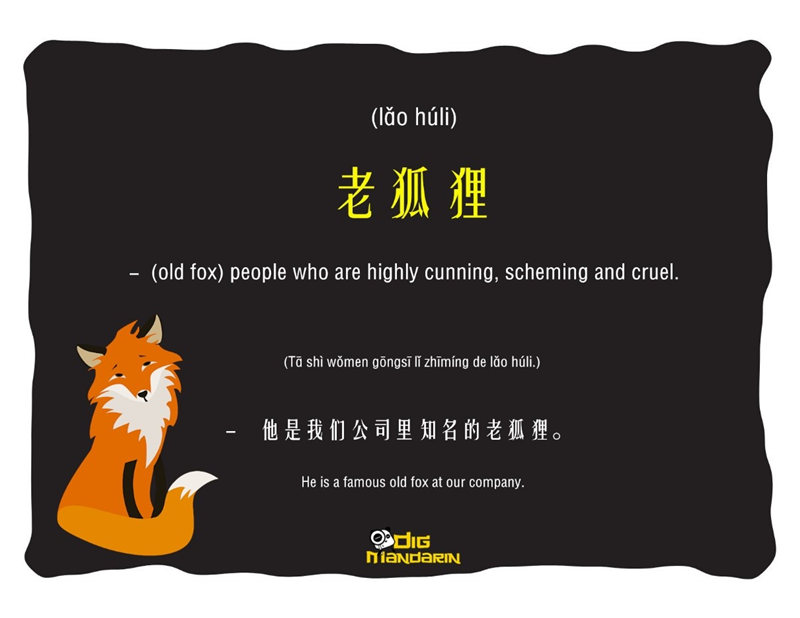
In Chinese people’s minds, 狐狸 are sharp, smart, and sly. 老狐狸 literally means old fox, and Chinese people use it to refer to people who are highly cunning, scheming and cruel.
E.g.
这个人是只老狐狸。
(Zhèɡe rén shì zhǐ lǎo húli.)
This man is an old fox.
他是我们公司里知名的老狐狸。
(Tā shì wǒmen ɡōnɡsī lǐ zhīmínɡ de lǎo húli.)
He is a famous old fox at our company.
Those are some of the most common and important animal-related Chinese slang expressions. We hope that this list can help you improve your fluency and your understanding of Chinese culture.





Awesome article. Can’t wait to impress the coworkers with these ahaha